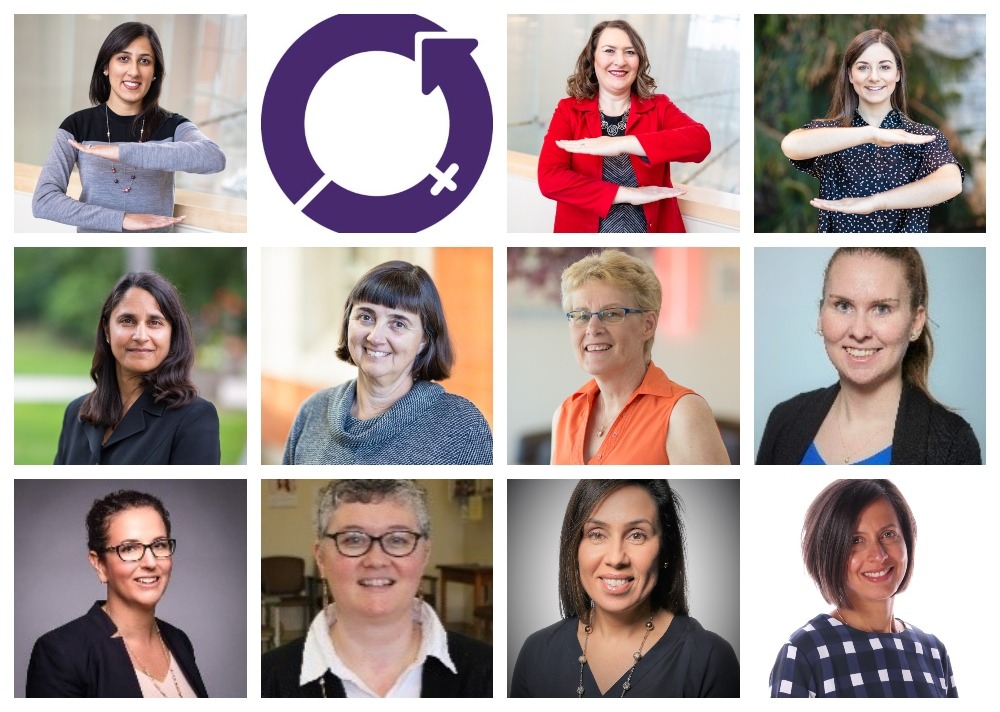
International Women’s Day: Changing lives through research
On International Women’s Day, Hamilton Health Sciences (HHS) is highlighting some of our many talented researchers who are changing lives through their work, and mentoring the next generation.
These women are tackling real issues in health and medicine that span many diverse areas of care at HHS. Some areas of active research include cardiology, child youth mental health, cancer and mind-body health interventions such as dancing for cognition and exercise in aging. Their work is having a positive effect locally for patients, families and community members who participate in clinical trials. Together, our researchers and community contribute to global knowledge on serious illnesses.
“I am proud to support a research enterprise comprised of these diverse, collaborative women who are building a new research culture and generating high-quality science,” said Katie Porter, Director of Research Administration, Hamilton Health Sciences.
For the second consecutive year, HHS has been ranked third in Canada for hospital-based research with more than 2000 research studies happening at our various sites and centres at any given time.
While HHS is proud of our all of our researchers, today we recognize the growing number of women in research at HHS whose work and leadership are inspiring others and making a difference.
To compile the profiles below, we asked researchers about inspiration and motivation in their own lives, and to provide some advice for other women in the field.
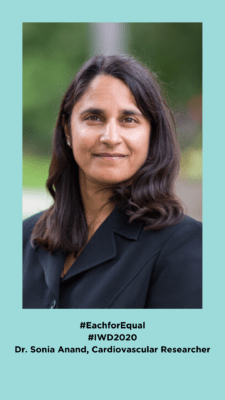
Who inspired you to become a researcher?
My physician-parents inspired me to pursue a career in medicine. I was a curious child and took on independent school projects in a wide variety of subjects from english to science. This curiosity continued as I began studying medicine.
What motivates you to do research?
Solving my patients’ problems and understanding societal patterns of disease motivate me to do research.
What advice do you have for women considering including medical research as part of their career?
If you are a curious person and passionate about medical research, Go for it!, work hard, and your path will be rewarding!
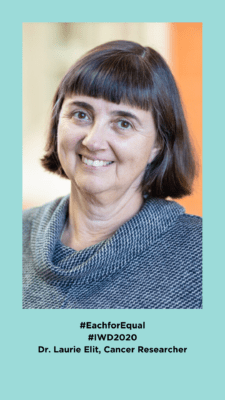
Laurie Elit
What or who inspired you to become a researcher?
My initial cancer surgical training was in Philadelphia. They were part of a collection of centres doing clinical research to define best care for women with gynecologic cancer. They were known as the Gynecologic Oncology Group (GOG). They thought very systematically about issues. This was my first experience seeing women and researchers come together to improve care.
What motivates you to do research?
Better outcomes for patients tomorrow than we have today.
What advice do you have for women who are considering medical research as a career?
Education and experience and mentorship are part of the recipe for success. The other part, as Wayne Gretzky said, is ‘Look for where the puck is going.’

Who inspired you to become a researcher?
I was inspired to become a researcher by my mother, Dr. Jo-Ann Fox-Threlkeld. My mother, who trained as a nurse in the late 1950s, returned to school after having three children to complete her BN and then a Master’s degree and eventually a PhD in gastrointestinal physiology. She taught me to always be curious and to seek to understand what causes health and disease.
What motivates you to do research?
This has been my motivation as a scientist. I have only worked in science, starting straight after high school and then every summer thereafter, including during medical school. During my residency training my elective time was often spent in the lab.
What advice do you have for women who are considering medical research as a career?
For women considering medical research as part of their career, my advice is to find those mentors who support and drive your curiosity.
What motivates you to do research?
We know, in all fields of healthcare, that there are research to practice gaps – where what we know works in research takes a long time to translate to what we actually do in practice. Additionally, there are many things we do not yet have the answers to – especially in the context of substance use and mental health. Research is critical in helping us understand how to promote wellbeing, prevent illness, identify people who need help early, and intervene effectively.
I am a Registered Nurse on the Child and Youth Mental Health Inpatient Unit at McMaster Children’s Hospital and a PhD student in McMaster’s Health Research Methodology Program, supervised by Dr. Katholiki Georgiades at the Offord Centre for Child Studies. My research interests are focused on the co-occurrence of mental health and substance use concerns among youth. I am currently leading a research project in this area on the Child and Youth Mental Health Inpatient Unit (called The CAMP Study), which is funded by a Hamilton Health Sciences New Investigator Fund.
What motivates you to do research?
My research is focused on the power of dance to brighten the spirit, strengthen the body and sharpen the mind. This is important to me – in caring for my grandma – as the arts allow us to share in the moment together and optimize health.
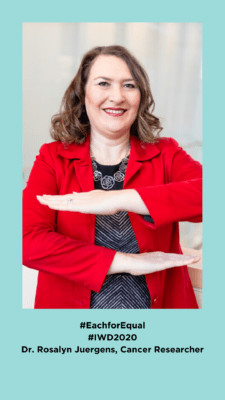
What motivates you to do research?
I am motivated to do research because I have observed first-hand its direct benefits for patients. In my career, I have watched lung cancer treatment expand from just chemotherapy to now multiple personalized options. These options are available because of advancements in pathology and in systemic therapies all defined through research.
I became a physician because I wanted to help patients. I chose a career in research because, through research, I have the best opportunity to help, not only my personal patients, but potentially patients across the globe.
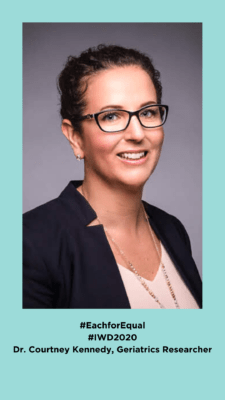
What motivates you to do research?
I consider myself a creative person, and one of the things I love about research is that it is absolutely an outlet for creativity. Getting to dream up big ideas and then test them out—that’s pretty cool! Health research is also very much a team sport. I love working with people—both colleagues and participants—to solve practical problems that can make a real difference in the day-to-day life of older adults. When I see that my research has helped someone with a mobility or cognitive challenge to engage more fully in their life? That’s my true motivation.
I am a clinical research scientist at the GERAS Centre or Aging Research and Assistant Professor in geriatrics with interests in mind-body health interventions (dancing for cognition and exercise) and frailty assessment and treatment.

Who inspired you to become a researcher?
A female research mentor taught me to believe in myself and that I could actually be a researcher. She saw something in me that I had probably been ignoring and challenged me to pursue it which has led to an entire change in my career trajectory. She still pushes me and I know is there for me when I need help. I think a lot of us are actually scared of the thought of being a researcher and assume that we cannot do it, but surrounding yourself with individuals who believe and motivate you is essential.
What motivates you to do research?
I actually think research is fun so in that way it is easy to be motivated. I love problem solving and therefore it was a natural fit for me. I have also surrounded myself with strong, motivated female mentors who continually push me to achieve my personal best.
What advice do you have for women considering research as part of their career?
Mentorship is key. Surround yourself with individuals who will support you and believe in you. Also learn to advocate for yourself. And it’s okay to doubt yourself and ask for help.
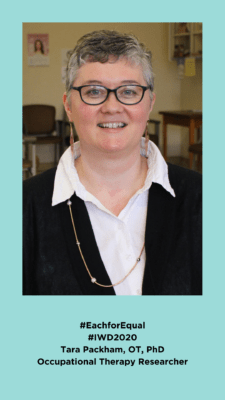
What inspired you to become a researcher?
I was frustrated there weren’t evidence-based pathways for care for a particular patient group in my practice, and I wanted to do better. I quickly realized a) it wasn’t just my practice, and b) the reasons for the lack of evidence were complex.
But I decided I could tackle one little part, and started chipping away at the problem. And again, quickly realized I needed more training to do a good job of it, so I signed up for one graduate course. And then a MSc…PhD…and a post-doctoral fellowship.
I was able to keep going because of the support of colleagues, and the amazing opportunities that opened up at every step of the way. I also had strong female mentors who helped me find (and sometimes trailblaze) my pathway.
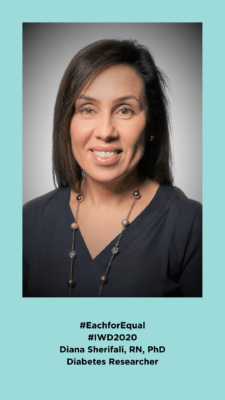
Who inspired you to become a researcher?
I am inspired by people living with diabetes and by my health care professional colleagues. I am grateful for these interactions as they provide understanding and context for current research and present ideas for future research opportunities.
What advice do you have for women considering research as part of their career?
My advice to women considering health research as a career path would be: 1) Be curious! Keep asking questions and explore; and 2) “Research is about relationships”…this is what my mentor told me. Find a mentor and surround yourself with supportive and collaborative colleagues who want to see you succeed!
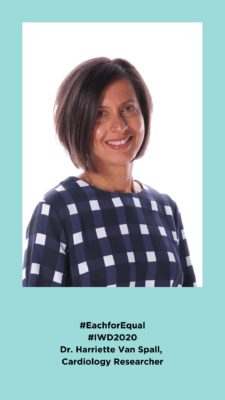
What motivates you to do research?
I am, by nature, curious. I enjoy pursuing answers to questions that are relevant to patients and to our health care system through the research that I conduct with my team. I love the intellectual stimulation that comes designing a study and from collaborating with other researchers. I relish mentoring students so that they understand research methods, cultivate research skills, and develop a passion for research. I am excited when our team presents the results of our work at conferences and publishes in impactful journals.
Being able to do work as both a cardiologist and a researcher is a childhood dream come true. My work as a cardiologist makes a difference to the patients I treat. My work as a researcher has a wider impact as it influences healthcare policy, guides the funding of health care services, and shapes the way that other physicians deliver care.
What advice do you have for women who are considering medical research as a career?
The demands of leading a research program whilst caring for patients and having a presence at home can be challenging for both men and women; an equitable work and home environment can make all the difference. Many medical research environments are male dominated, and women often experience fewer networking opportunities, less recognition, lower salary, and slower career advancement regardless of objective achievements. Navigating these challenges requires strategy, strength, and determination, and can serve as an opportunity for personal growth and organizational transformation. Finding mentors and allies who share your interests, vision, and values can be a big asset. Advocating for change that will benefit the women behind you is an important part of the legacy you leave behind: stand up, speak up, be courageous.

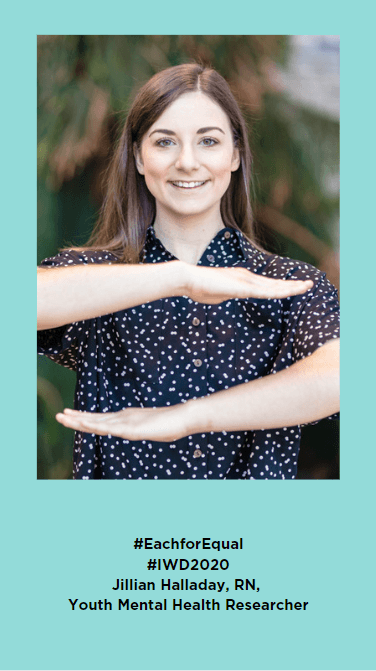
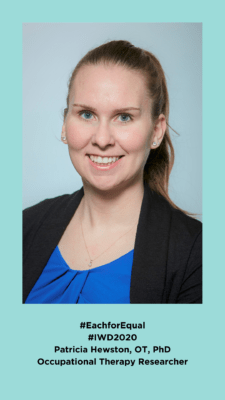 Patricia Hewston
Patricia Hewston